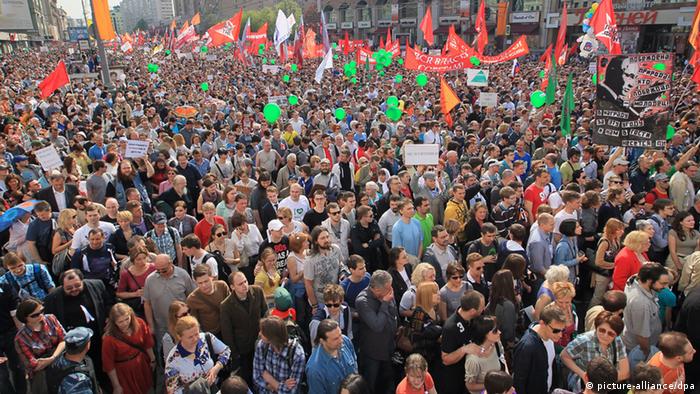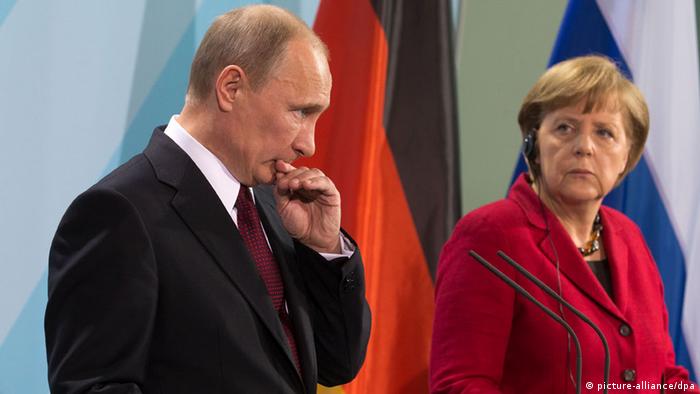From charges of election fraud to a harsh sentence for Pussy Riot members, recent months have seen ample tension in German-Russian ties. As leaders from both countries begin talks, DW looks at the chronology of events.
For the first time since Vladimir Putin's return to the presidency, German-Russian government consultations are to take place on Friday (16.11.2012). German Chancellor Angela Merkel will meet Russian President Vladimir Putinin Moscow and attend a conference of the Petersburger Dialogue, a civil society forum taking place in the Russian capital.
Such government meetings have been postponed several times since Putin took office for a third term in May. After the switchover in the Kremlin, Germany almost became the first foreign destination of both Putin and the new Prime Minister and former President Dmitry Medvedev. Merkel had previously invited the heads state to the Council of the Baltic Sea States being held on May 31 in Stralsund, Germany. Medvedev, however, sent his deputy to Germany. Merkel met with Putin a day later in Berlin.
Little sympathy for Putin
The timing of Putin's first state visit to Germany had remained unclear. Moscow indicated that the president would travel first to Belarus and Kazakhstan and then visit Germany. Ultimately, Putin ended up by flying to Berlin via Minsk, stayed there only a few hours, and then travelled to Paris on the same day.
Apart from that, German President Joachim Gauck was expected to visit Moscow in June. But Gauck ultimately did not attend the opening of the "German Year." German politicians said behind closed doors that the former church minister and civil rights activist has little sympathy for the president, a former KGB officer. Experts and journalists even state this openly.
Little sympathy for Putin
The timing of Putin's first state visit to Germany had remained unclear. Moscow indicated that the president would travel first to Belarus and Kazakhstan and then visit Germany. Ultimately, Putin ended up by flying to Berlin via Minsk, stayed there only a few hours, and then travelled to Paris on the same day.
Apart from that, German President Joachim Gauck was expected to visit Moscow in June. But Gauck ultimately did not attend the opening of the "German Year." German politicians said behind closed doors that the former church minister and civil rights activist has little sympathy for the president, a former KGB officer. Experts and journalists even state this openly.
 Thousands rallied in Moscow against Putin's return to the presidency
Thousands rallied in Moscow against Putin's return to the presidency
Resentment between Moscow and Berlin was ratcheted up following the Russian parliamentary elections of December 2011. German Foreign Minister Guido Westerwelle called for investigations of reports of election fraud and the German government said it regretted Russian presidential elections of May did not meet international standards.
NGOs as “foreign agents”
Furthermore, Putin has seemed to have ignored Merkel's request to modernize the country both politically and socially. After Putin's return the presidency, laws were passed that further constrain rights to assembly and demonstration. Authorities are now even allowed to brand non-governmental organizations as "foreign agents" if the groups receive foreign financial assistance.
All these laws have been heavily criticized in Germany. But the final straw was the conviction of the three members of the Russian punk bank Pussy Riot in August charges of hooliganism motivated by religious hatred. Merkel criticized the verdict as being "unreasonably harsh" and "inconsistent with European values."
Split over SyriaBoth governments also have completely opposite views regarding the conflict in Syria. Westerwelle said in the spring that Russia was "on the wrong side of history" as long as it continued supporting the regime of President Bashar Assad. His Russian counterpart, Sergei Lavrov, replied that Germany's foreign minister did not write history.
During Merkel's meeting with Putin in Berlin on June 1, the chancellor reportedly asked Putin to grant Assad asylum. Lavrov replied later on: "Our side regarded this suggestion as a joke."
A clash between the two governments was also caused by the criticism from the German government's commissioner to Russia, Andreas Schockenhoff, over Russia's position on the Syrian conflict. Schockenhoff stated that Moscow would lose its role in the Arab world after the downfall of the Assad regime.
A controversial resolution
The Russian Foreign Office reacted promptly and condemned the remarks, but this did not stop Schockenhoff from also repeatedly criticizing Russia's shortcomings as a constitutional democracy. In response to the accusations, Moscow asked for the commissioner to be removed.
New friction was caused by a critical Russia motion adopted by the Bundestag on Friday (09.11.2012). The resolution, initiated by Schockenhoff, stated: "Parliament notes with mounting concern that, since President Vladimir Putin's return to office, legislative and judicial measures are being taken which combine towards increasing control over active citizens, criminalizing critical engagement and creating a confrontation course against government critics."
For its part, the Kremlin rejected criticism of Russia's human rights record, calling the Bundestag resolution a part of domestic German politics.
Russian government spokesperson Dmitry Peskov told Russian news agencies that if matters of democracy and civil rights were discussed during talks Putin would offer a "thorough explanation and ask his questions in turn."
"We are well aware of the heightened anti-Russian rhetoric in Germany in recent weeks or even months," Peskov said. "We are aware of the demands Mrs Merkel faces from Bundestag deputies and others to raise various human rights and democracy issues with Putin."
sourche: http://www.dw.de/resentment-strains-german-russian-relations/a-16382648

Δεν υπάρχουν σχόλια:
Δημοσίευση σχολίου